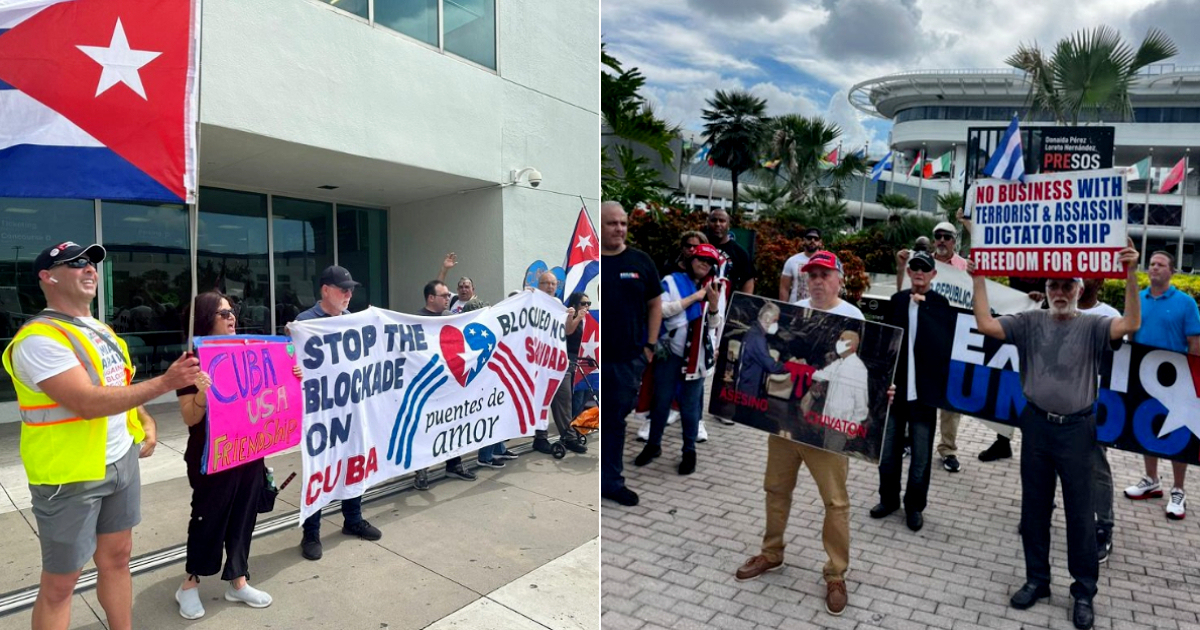The Miami International Airport became the stage for two opposing protests on Sunday, each rallying for their distinct perspectives on the situation in Cuba. Supporters of the Cuban regime, organized by the group Puentes de Amor, and Cuban exiles grouped under Exilio Unido Ya (EUY), converged at the location, leading to a direct confrontation between the factions.
From early hours, members of Puentes de Amor, led by activist Carlos Lazo, gathered at the airport's Plaza of the Flags. According to Cuban state media Prensa Latina, the demonstrators waved Cuban flags and unfurled a banner with the message "End the Blockade," visible to all entering the busy airport train station.
On his Facebook page, Lazo noted that the event organizers had informed Miami airport authorities, the police, and the FBI about potential threats and provocative actions from opposition groups. Prensa Latina also mentioned the participation of Max Lesnik, a notable admirer of dictator Fidel Castro, who stated that the "patriotic migrants" were once again present to demand the end of the economic embargo imposed by the United States on Cuba. According to Lazo, this caravan is part of a tradition started in 2020, where activists gather at the end of each month to protest the embargo.
Simultaneously, a group of Cuban exiles demonstrated at the same location to denounce the repression by the Cuban regime and to demand the release of political prisoners. Marcel Valdés, one of the leaders of Exilio Unido Ya (EUY), commented that after a long time, they finally obtained authorization to protest at the airport. Valdés emphasized that their action was intended to dismantle what they consider "the circus of the accomplices of a murderous dictatorship."
EUY activists, led by Ramiro Collazo and Joel Riverón, have had previous clashes with regime supporters. Last April, during a May Day event in Homestead, Collazo and other EUY members confronted Carlos Manuel, known as Indio Taíno, for his support of the Castro regime. Additionally, in May, EUY members intervened when pro-Palestinian demonstrators placed a scarf on a bust of José Martí in Coral Gables, an act they deemed a desecration.
The duality of these protests at Miami Airport highlights, on one hand, the infiltration of Cuban State Security in the neighboring country and the actions carried out alongside accomplices and supporters; on the other hand, it underscores the growing rejection of these actions among Cuban exiles, who predominantly insist that the true fight is for democracy and the freedom of political prisoners on the island.
Key Facts About the Protests at Miami International Airport
To provide more context and clarity on the events, here are some frequently asked questions and their answers.
Who organized the pro-regime protest at Miami Airport?
The pro-regime protest was organized by the group Puentes de Amor, led by activist Carlos Lazo.
What was the main message of the pro-regime demonstrators?
The main message of the pro-regime demonstrators was to demand the lifting of the economic embargo imposed by the United States on Cuba.
Who were the key figures in the anti-regime protest?
The anti-regime protest was led by Marcel Valdés, Ramiro Collazo, and Joel Riverón from Exilio Unido Ya (EUY).
What is the main aim of Exilio Unido Ya (EUY)?
Exilio Unido Ya (EUY) aims to denounce the Cuban regime's repression and demand the release of political prisoners.
